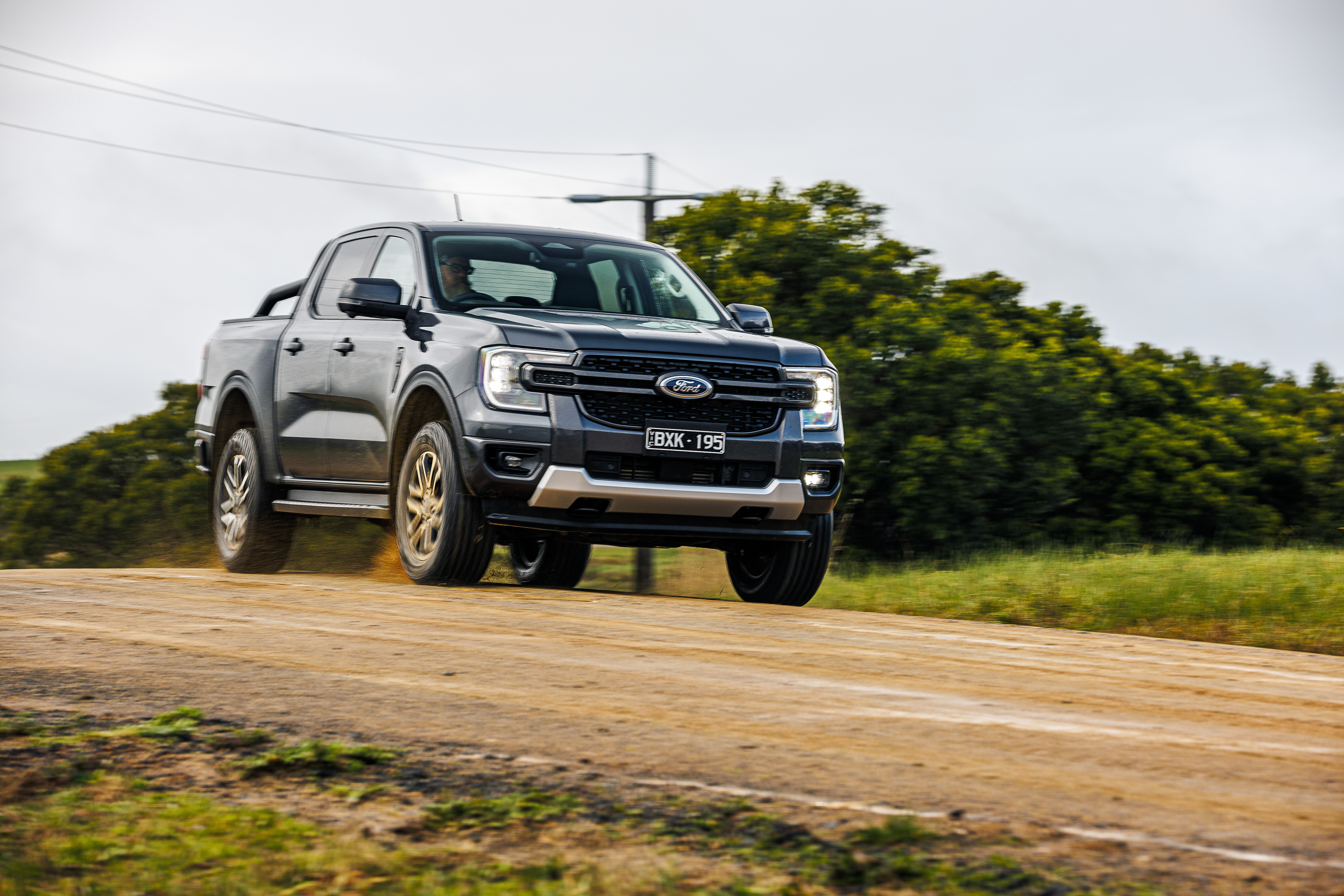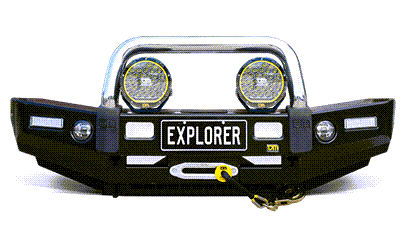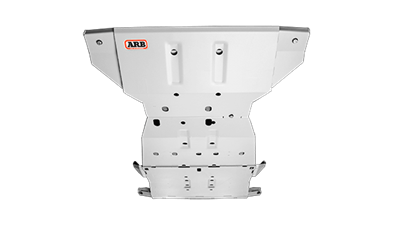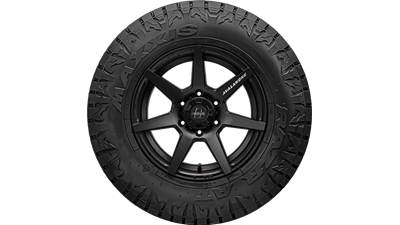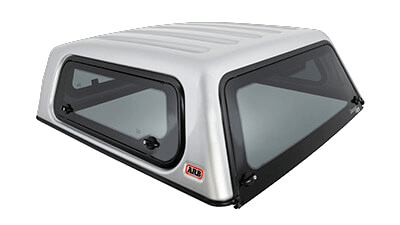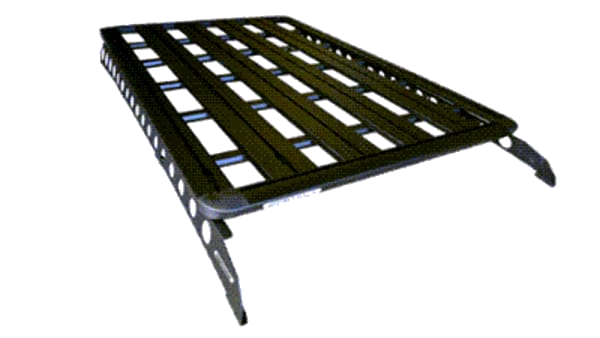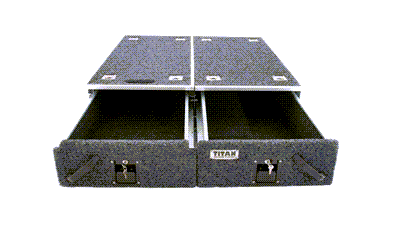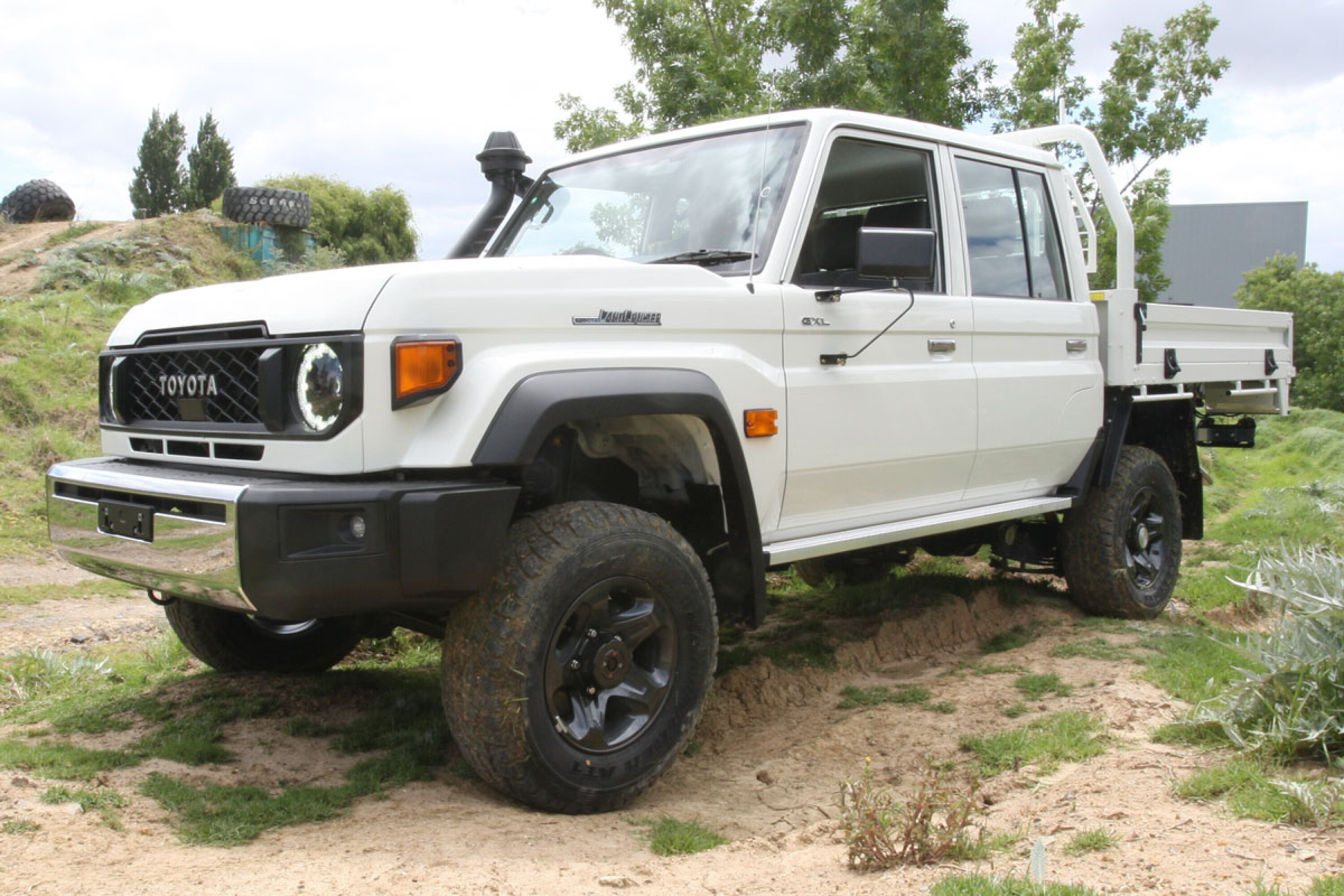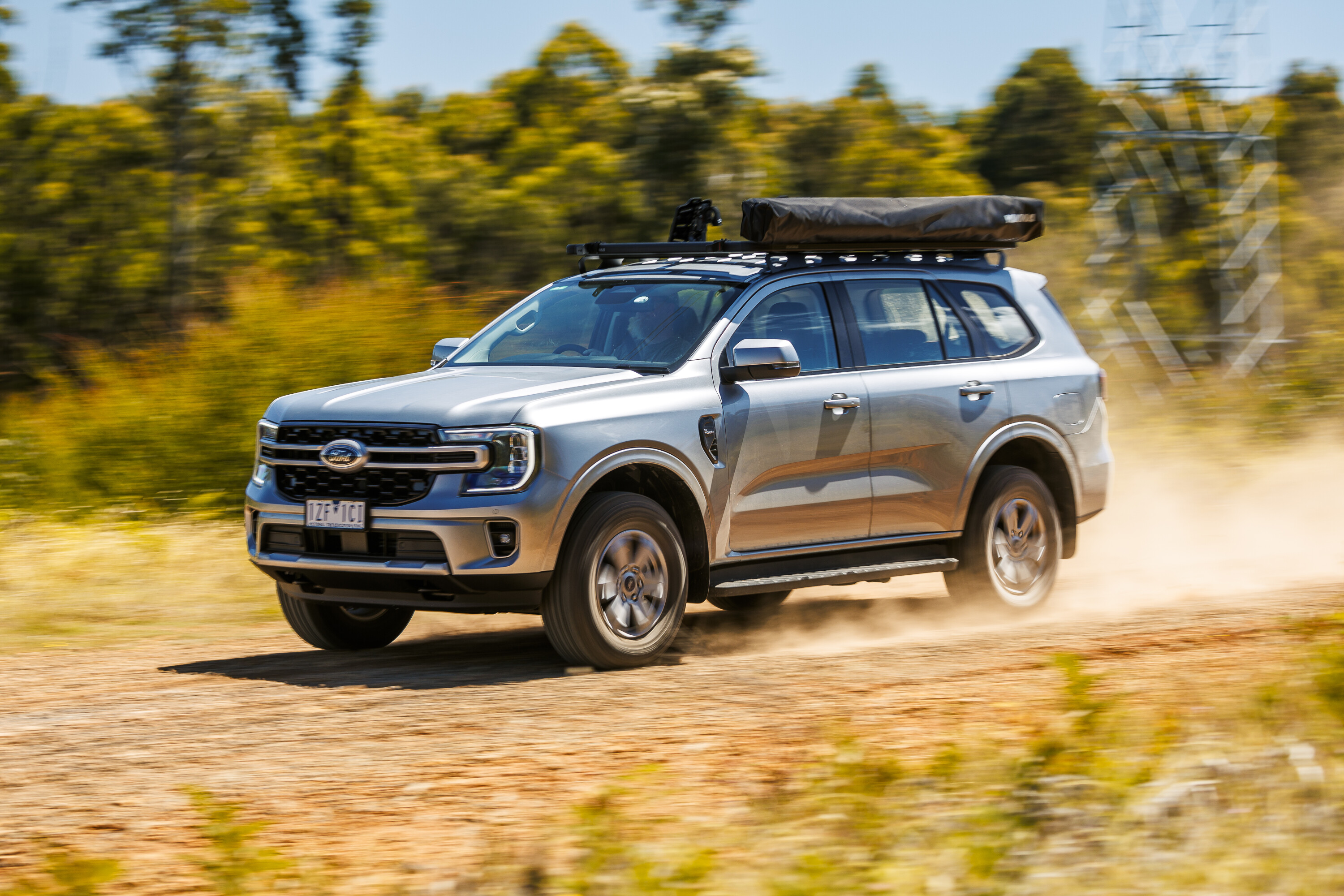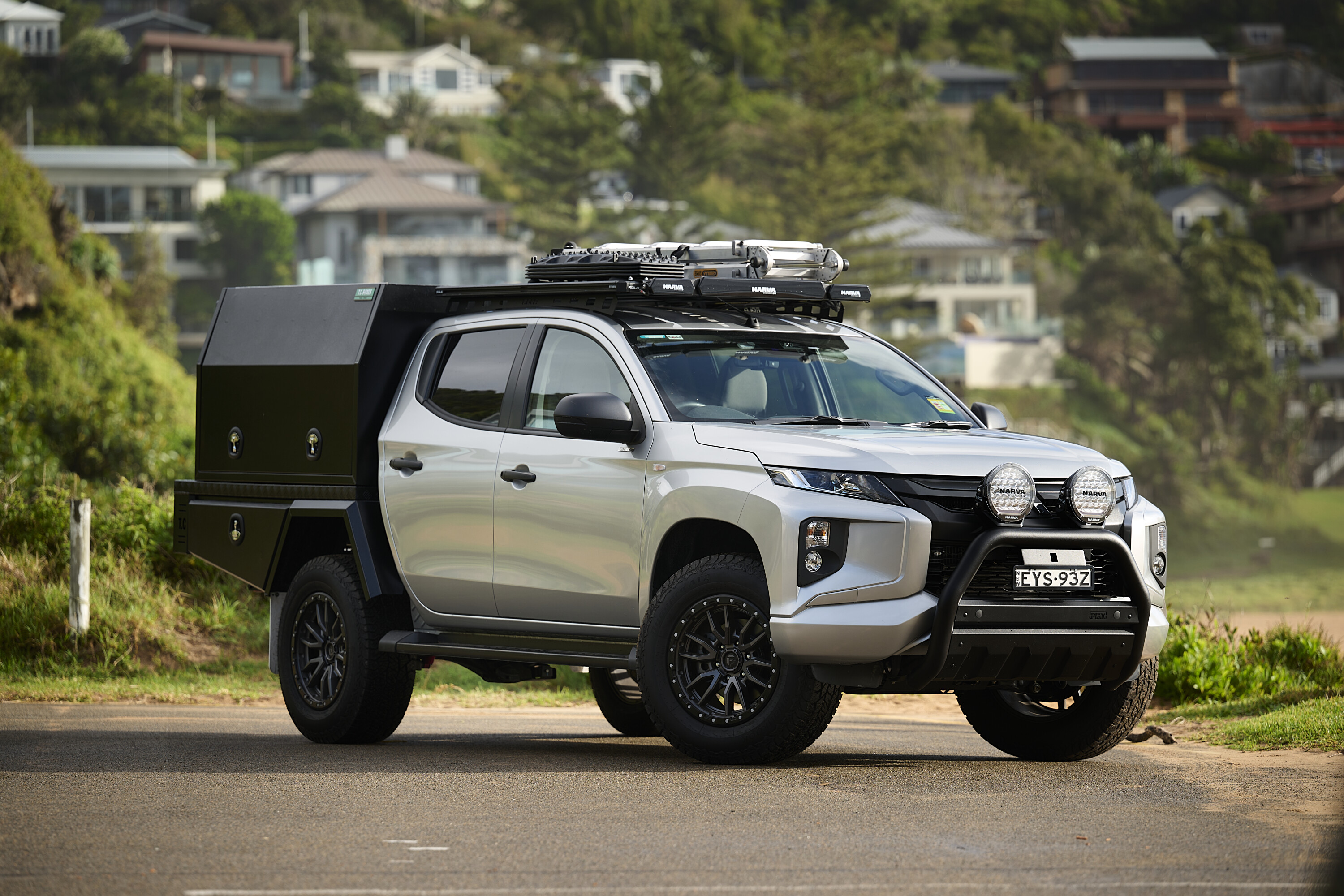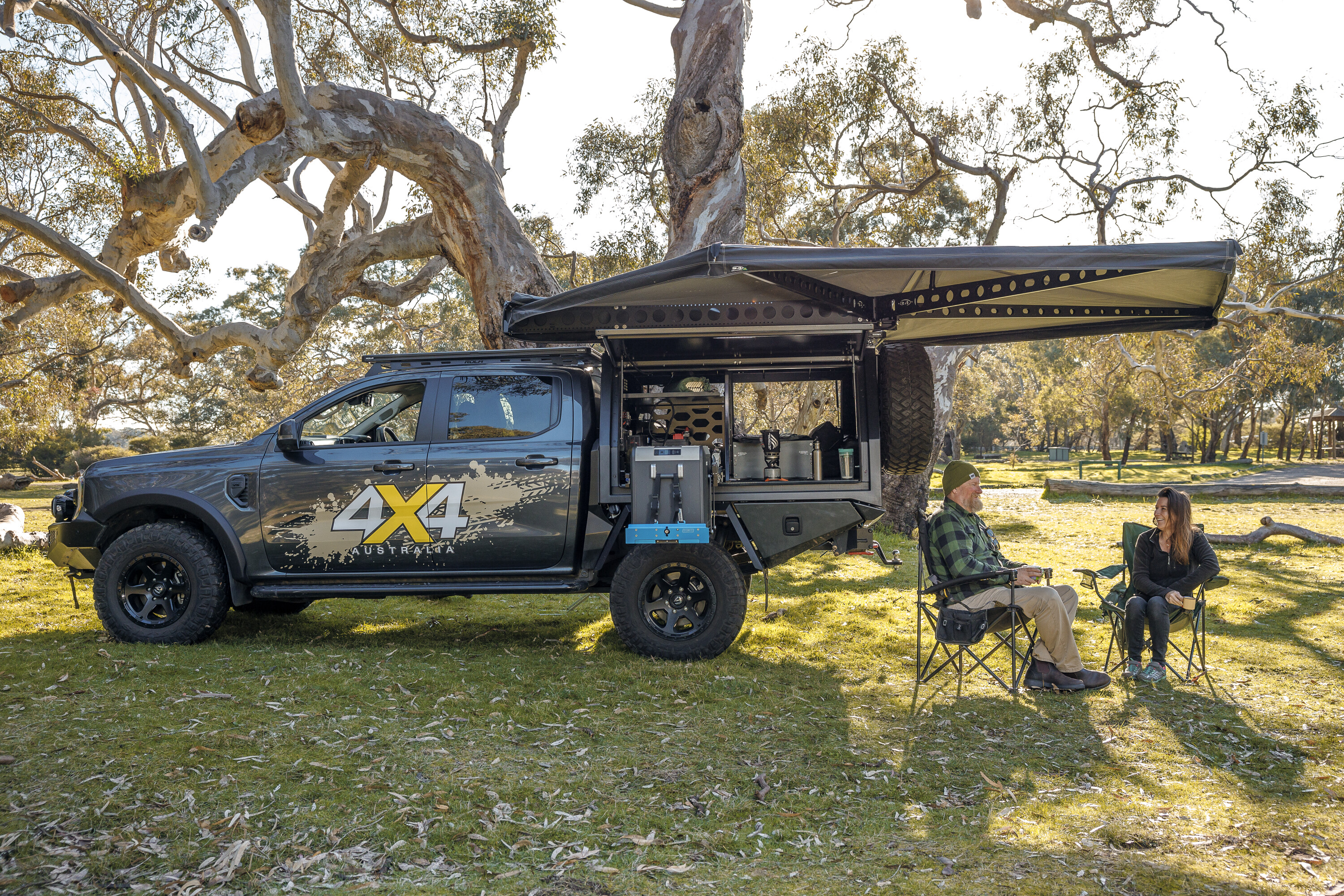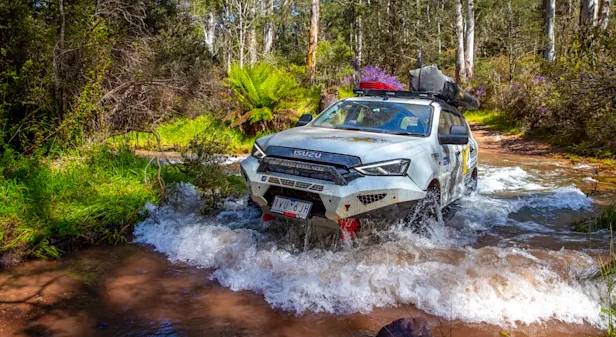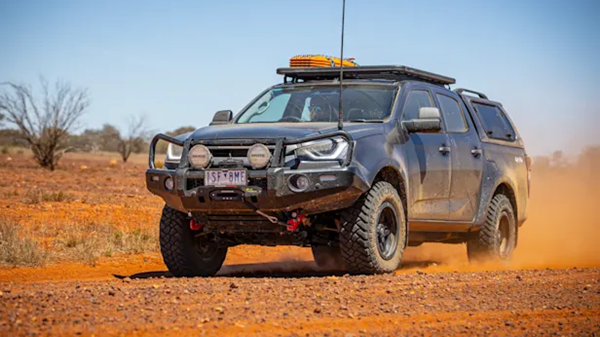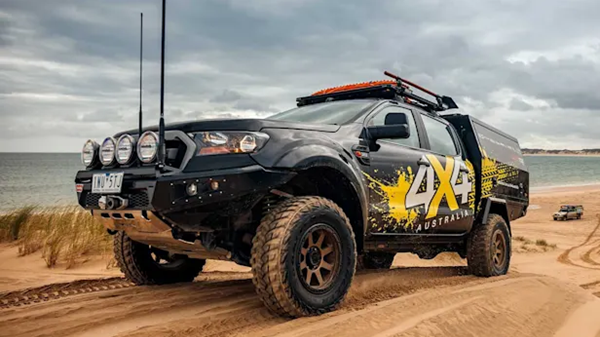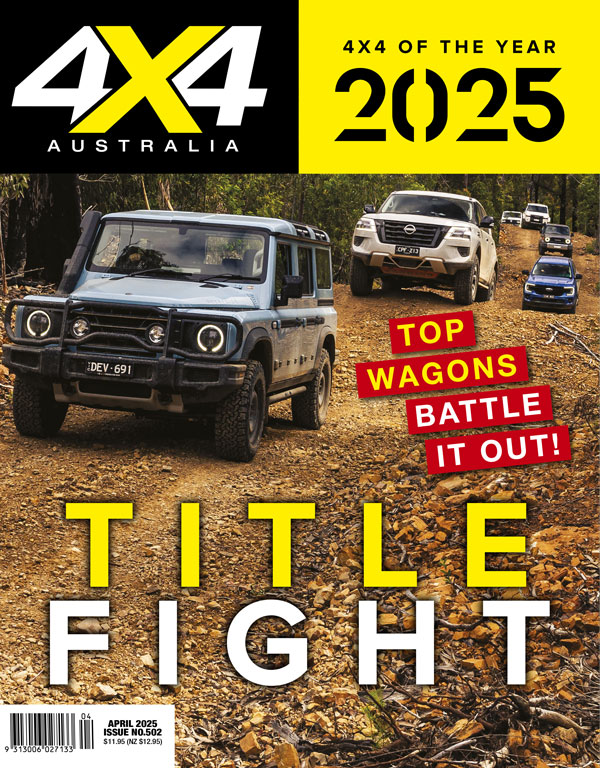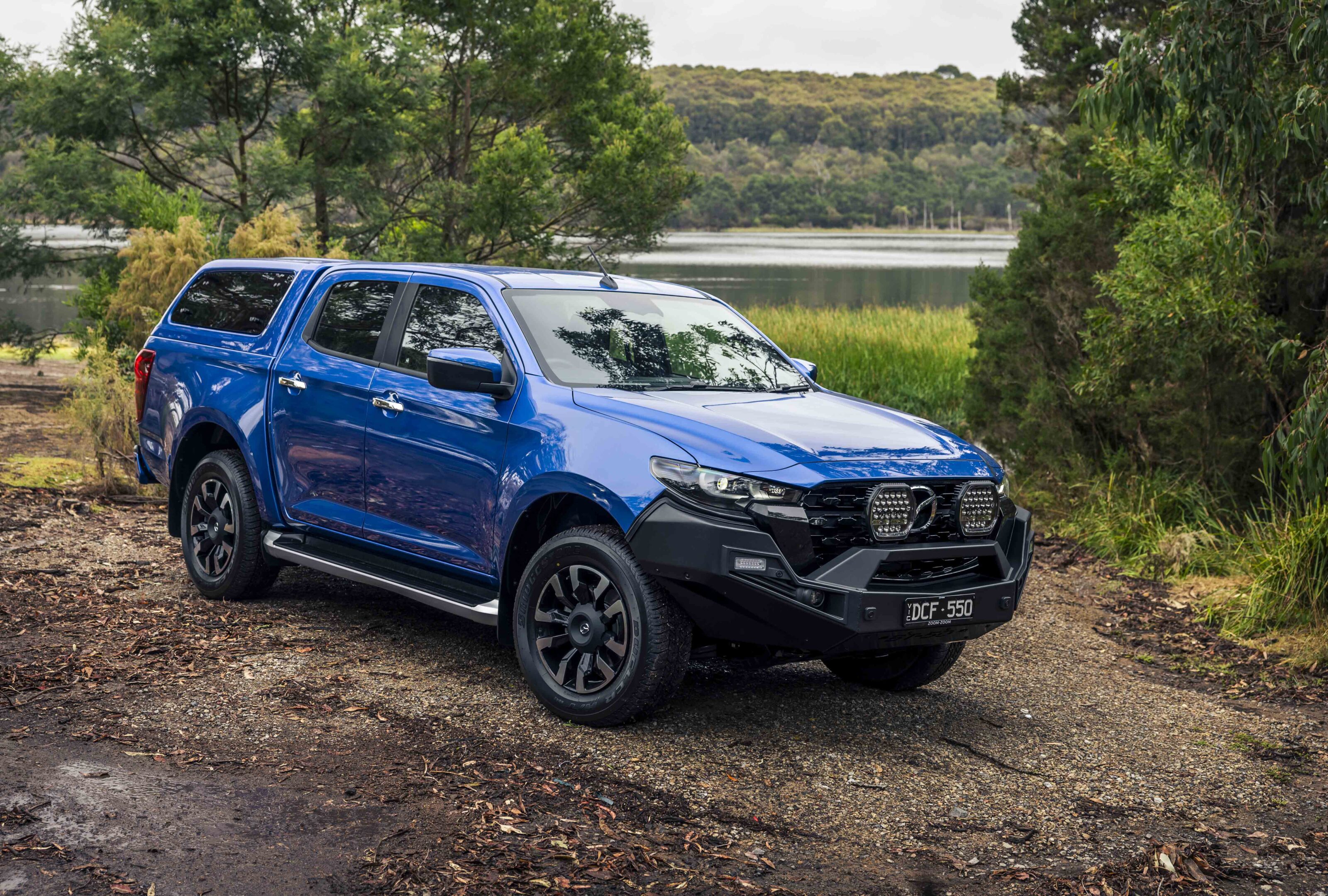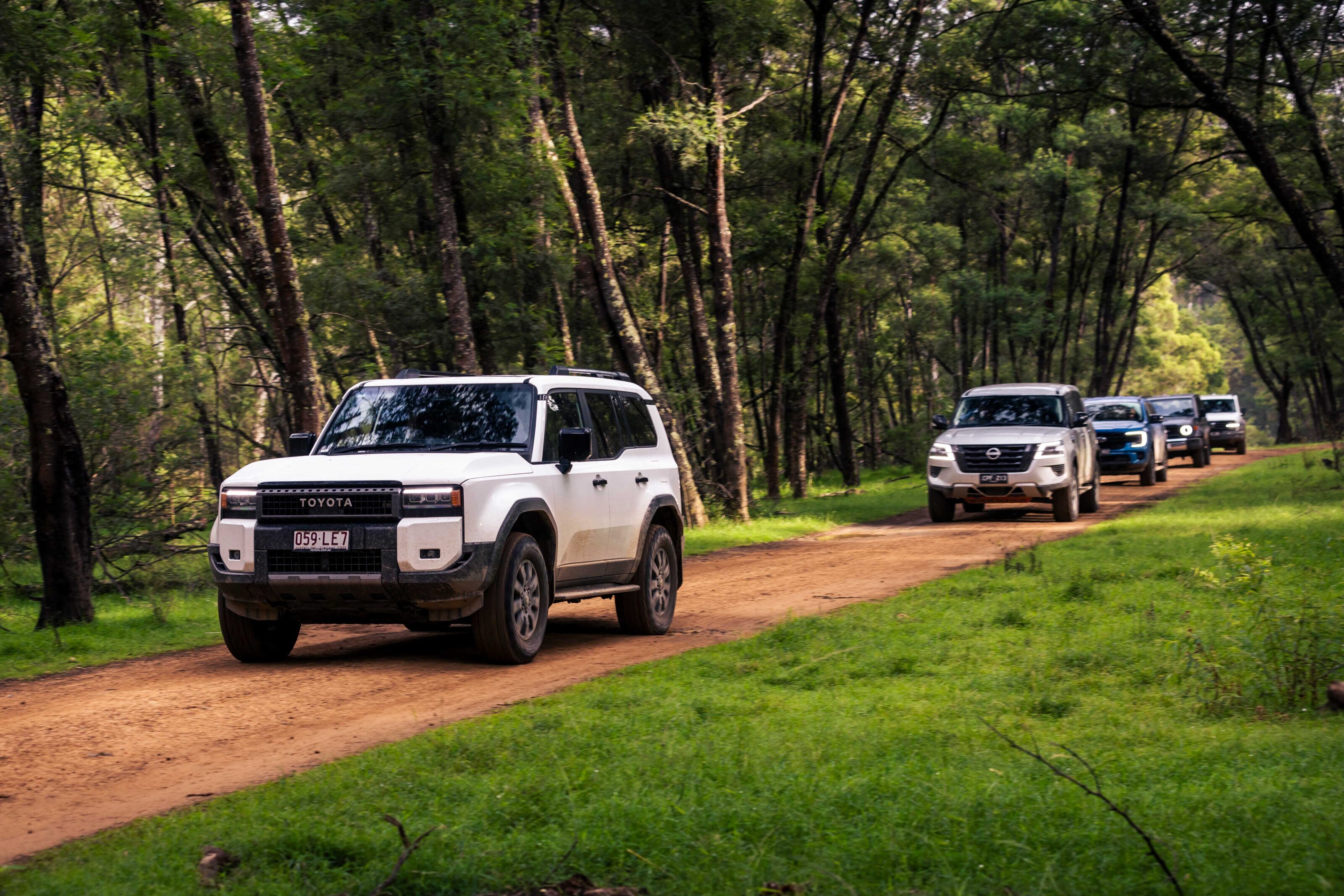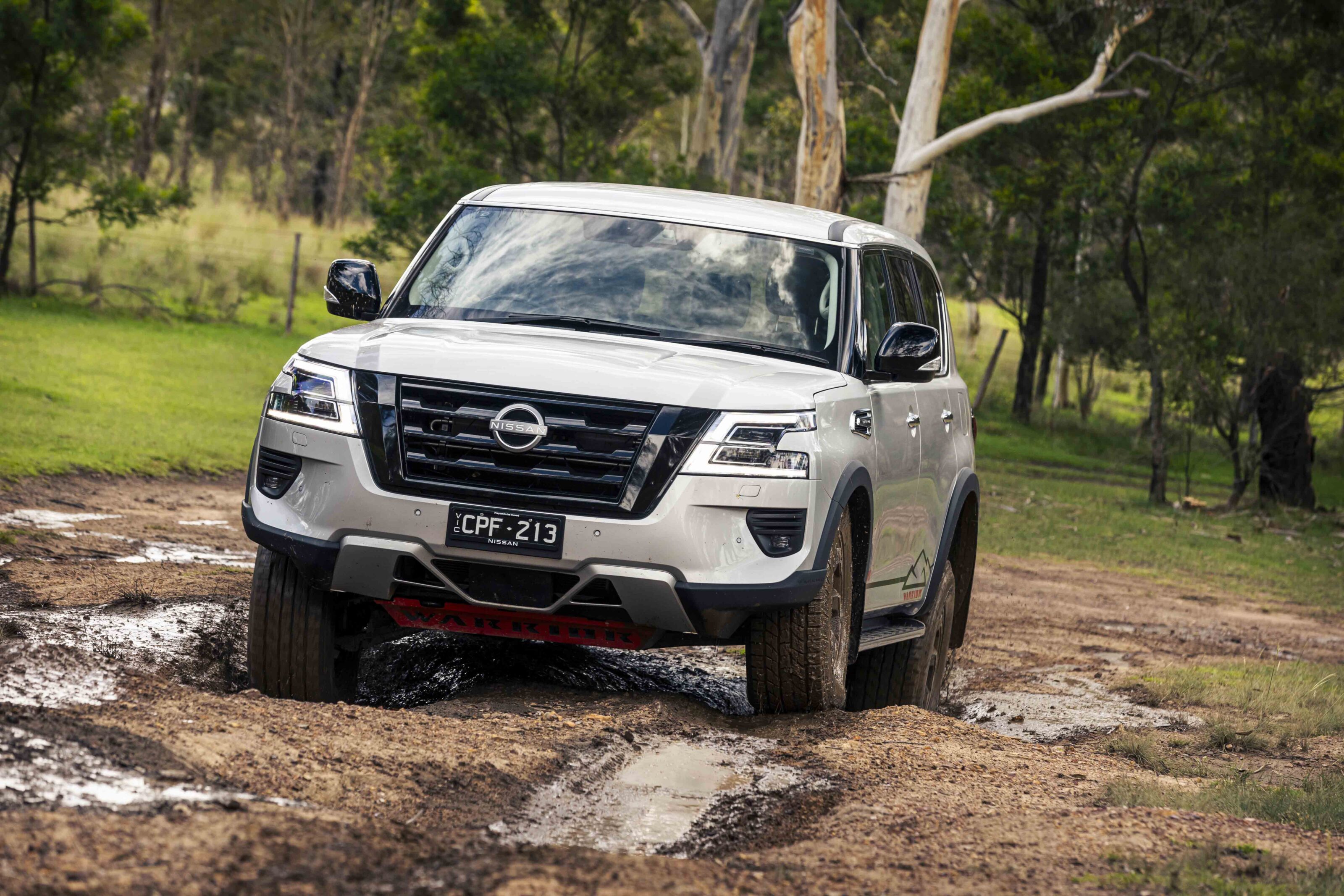Things we like
- Performance and refinement of drivetrain
- Level of standard equipment
- Excellent off-road ability
Not so much
- No manual gearbox offered
- TPMS only standard on Wildtrak model
- Over complicated electronic features and functionality
Ford’s 2023 Ranger ute has set the mid-size 4×4 ute segment on fire since its launch just three months ago.
A combination of fresh, bold design, a choice of engines and class-leading technology has put the ‘Next-Gen’ Ranger at the top of every potential ute owner’s shopping list.
The 2023 Ford Ranger is almost all-new from the ground up. The central body structure including the cabin, door openings and glasshouse are close to the same as the PX series Ranger in size and shape with a few revisions, while everything else – including the chassis, sheet metal, interior, powertrains, cargo tub and suspension – are either new or heavily revised.
The 2023 Ford Ranger is available in five double-cab 4×4 model grades starting with the Ranger XL at $49,930, the Ranger XLS at $54,330, Ranger XLT from $61,990, Ranger Sport from $63,990 and top of the range Ranger Wildtrak from $70,190.
Upgrade your Ranger
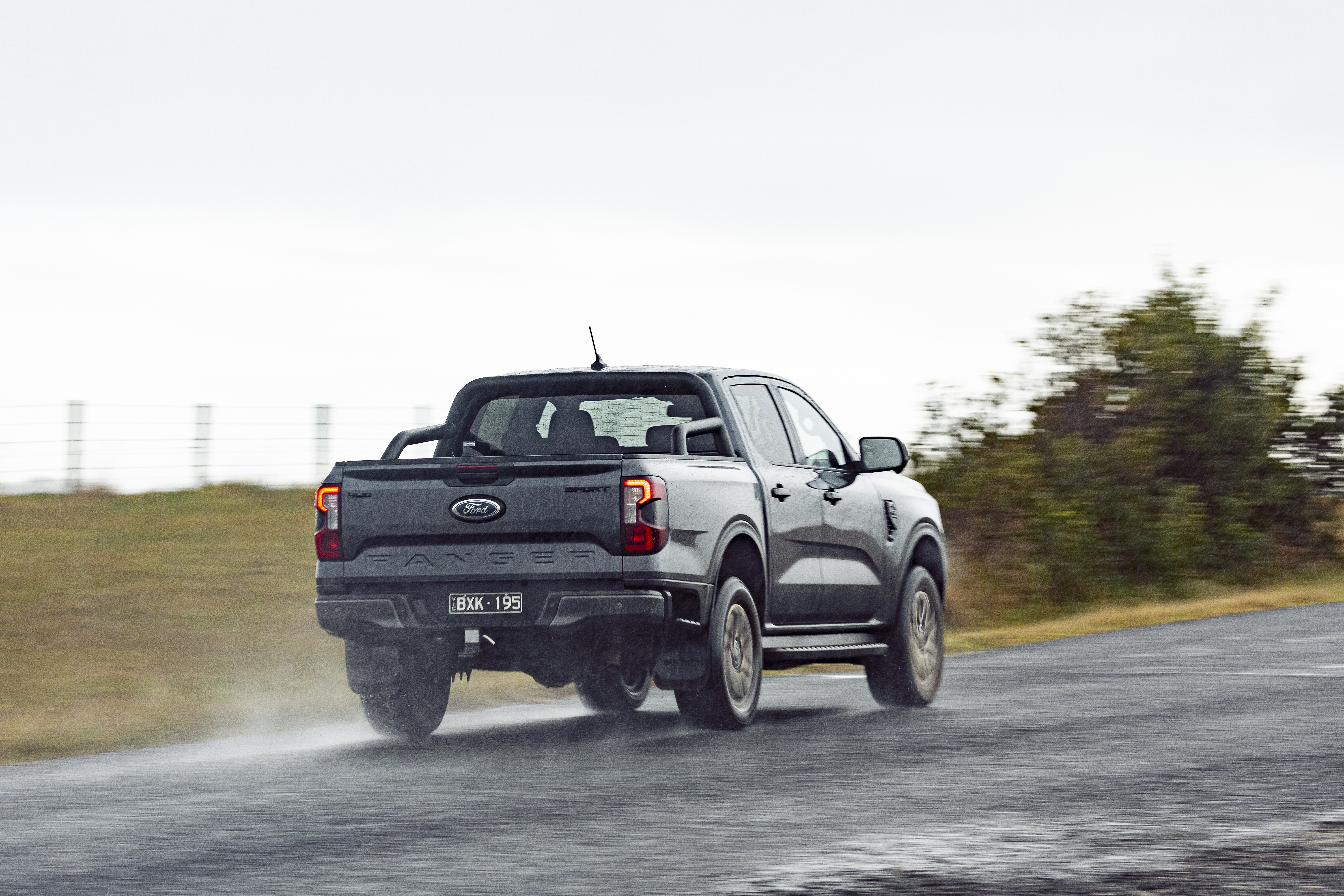
Those prices are all for Rangers fitted with the 2.0-litre diesel engine which is available in all grades while only the XLT, Sport and Wildtrak can be optioned with the new 3.0-litre V6 diesel engine. The V6 engine adds $3000 to the price of the Ranger.
The Next-Gen Ranger will also be available in single-cab and extra-cab models, but these are yet to arrive in Australia.
We’re reviewing the Ranger Sport V6 this time, which starts at $66,690 plus on-road costs.
Powertrain
Ford pulled its 3.0-litre ‘Lion’ V6 engine out of mothballs for the new Ranger but it has been heavily revised and upgraded since it last appeared in an Australian Ford-badged vehicle, the SZ Ford Territory diesel.
It was 2.7-litre in capacity back then but now it is a 3.0-litre as it was recently used in the Ford F-150 Power Stroke full-size pickup truck.
This Ford V6 diesel engine now produces 184kW of power and 600Nm of torque, which eclipses the 147kW and 470Nm of the 3.2-litre engine it replaces in the PX Ranger.
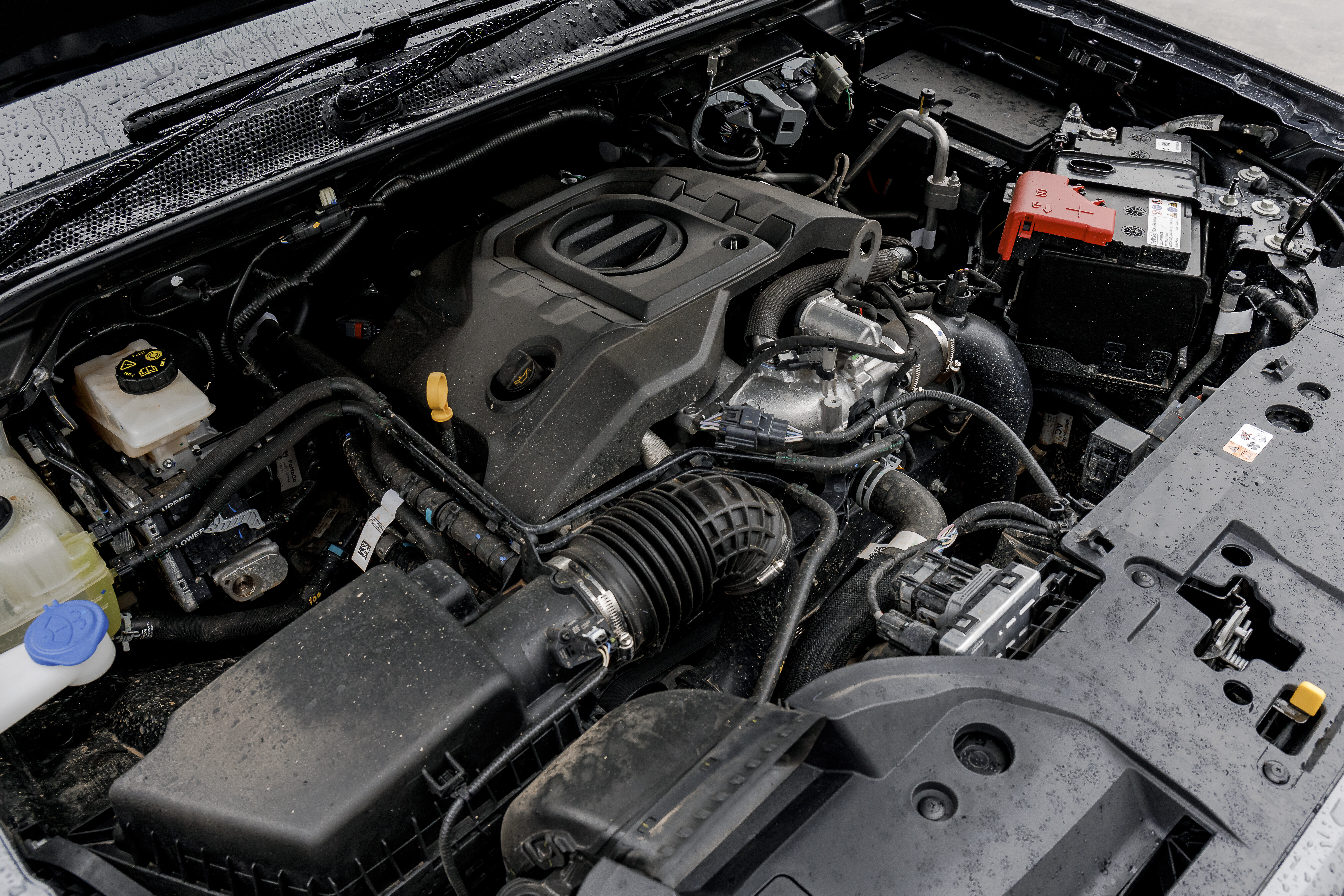
It also offers the most torque in the class and is only out-powered by the 200kW available from some models in the existing Volkswagen Amarok range.
On the road and tracks the V6 delivers its grunt seamlessly through Ford’s 10-speed automatic transmission which has been heavily revised for this new application over how it appeared in the previous PX generation of Ranger.
By far the biggest advance that the V6 and 10-speed brings to the Ranger and 4×4 ute category, is a level of refinement previously unseen in the mid-size segment.
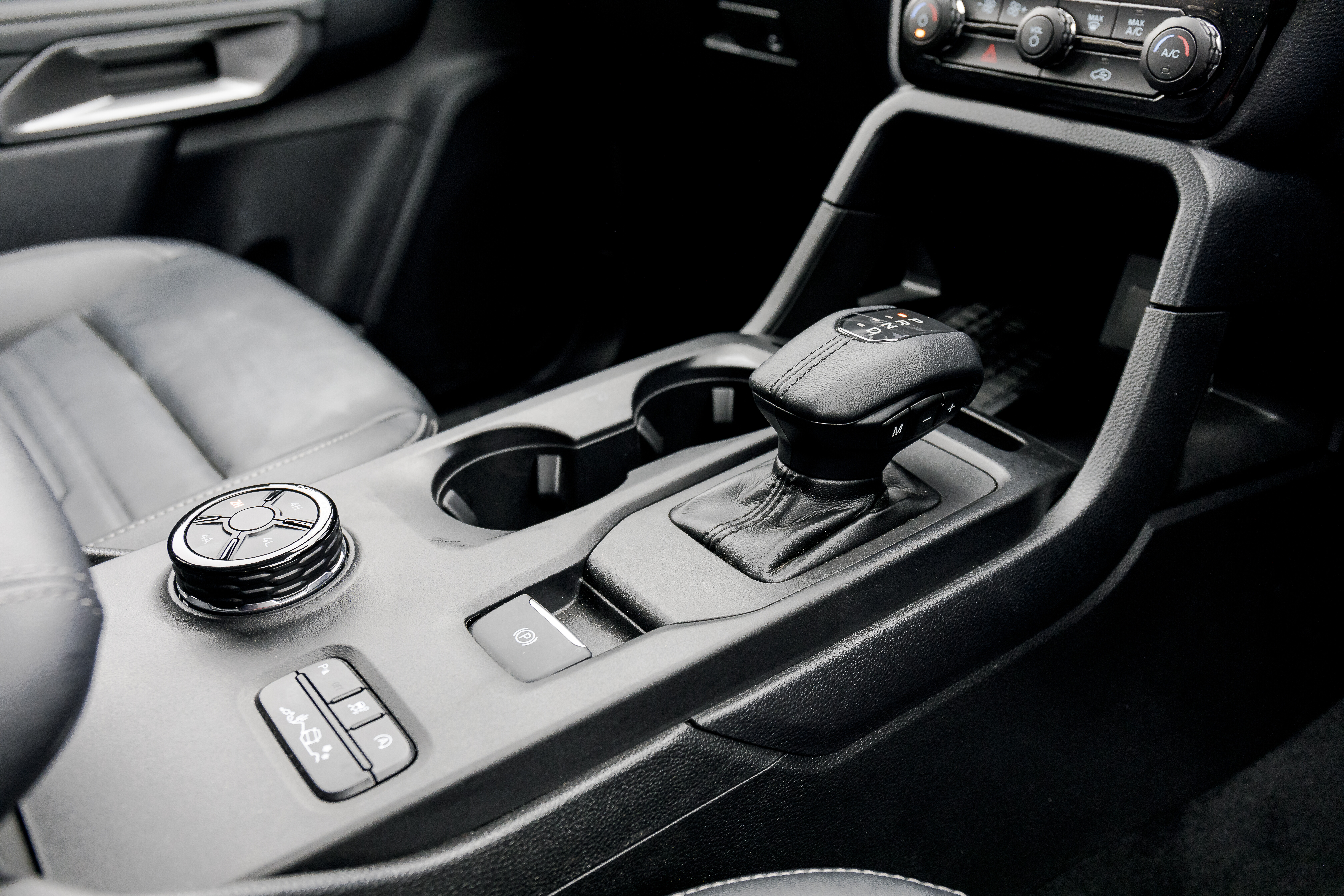
On-road and handling
The Ranger’s ladder-frame chassis has been made wider for a number of reasons, including fitting the V6 engine up front and widening the wheel track for improved dynamics.
The 50mm extra width in the wheel track and equal amount added to the length of the wheelbase, are felt in the vehicle’s stability and ride control.
The track width takes the wheels out to the extremes of the body which benefits both ride and handling, as does moving the rear shock absorbers to the outside of the chassis rails where they have more leverage on the axle.
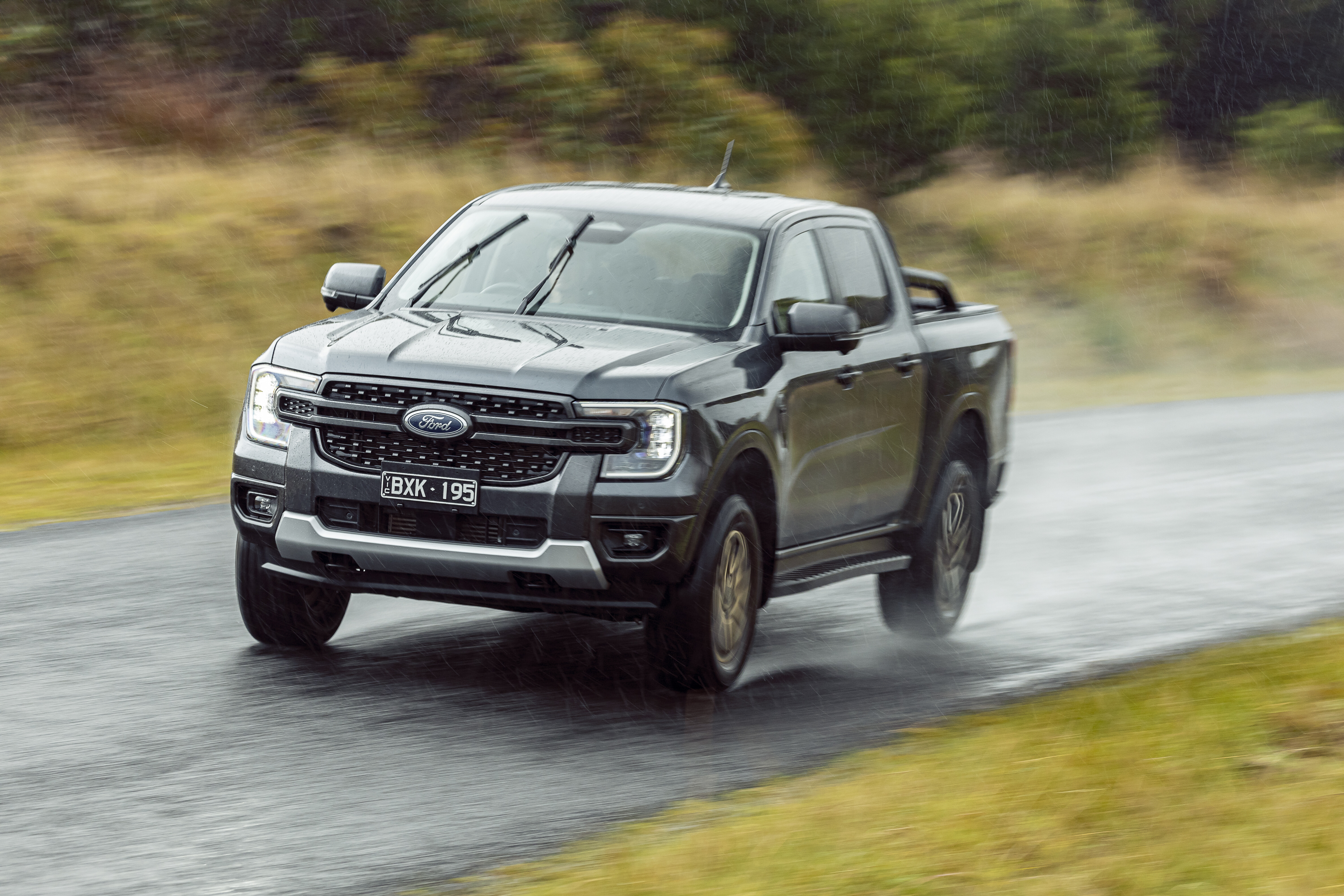
The changes and increased dimensions give the Ranger a more sure-footed and controlled presence on the road, adding to the feeling of it being a bigger truck.
The coil front and leaf-spring rear suspension feels firm over rough roads, but never jittery or uncomfortable. This ride quality is the small price you pay in a vehicle designed to carry a tonne on-board or tow 3.5 tonnes.
The new full-time 4×4 system of the new Ranger is a benefit on rough tracks and wet roads, where it also improves the sure-footedness of the chassis.
It’s also handy in the suburbs where, on wet roads, part-time systems in 2WD are prone to wheelspin when pulling out into traffic or when towing heaving loads.
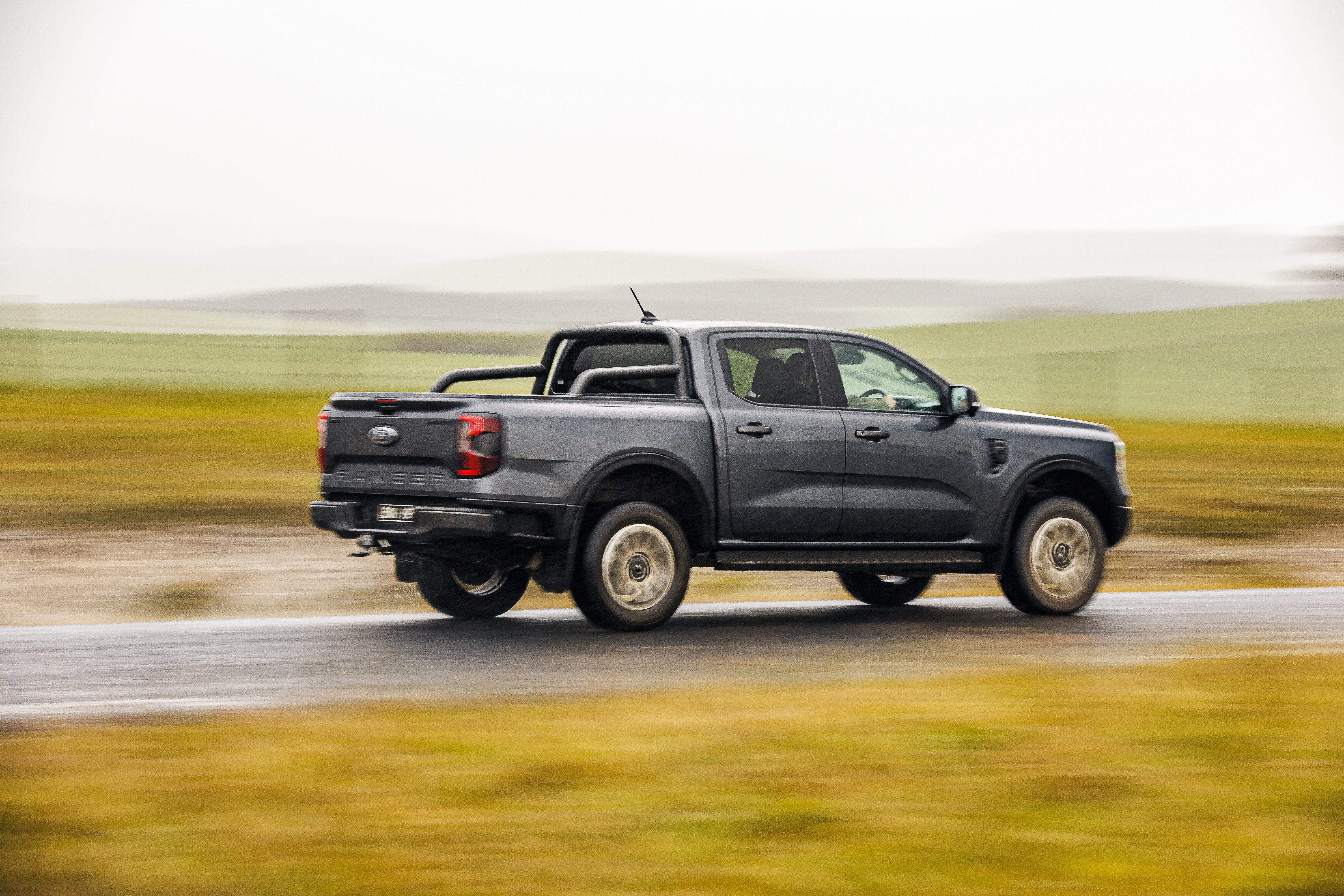
Off-road
The Ranger’s new chassis also benefits the ute when driving off road, allowing for more articulation of the rear axle to keep the wheels on the ground in uneven terrain.
The Ranger has never really suffered in this regard, but it is now better than it was in the outgoing model. The independent front end still suffers a bit and picks up wheels quite easily.
For when those tyres do lose traction in the rough or slippery terrain, the Ranger has an effective electronic traction control system (ETC) which remains active if and when you engage the standard rear differential lock (RDL). Not all 4×4 utes do this and it makes a big difference in their capability.
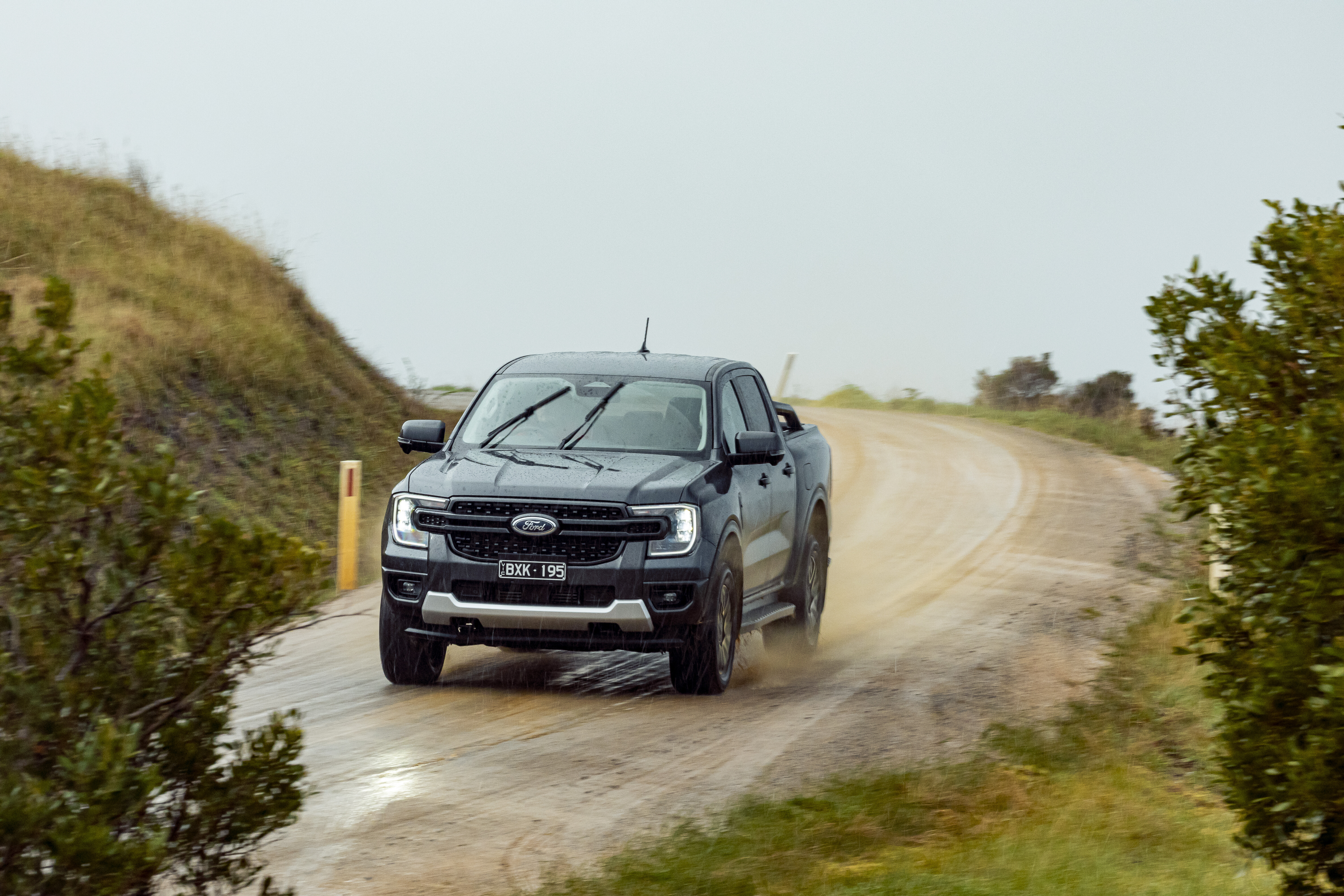
Heading along a rut up a steep, loose surface, the Ranger is prone to allow the wheel to slip a fraction before the ETC catches it and sends the drive where it is most effective.
Playing with the drive modes and selecting the ‘mud and ruts’ setting sharpens up the response to better suit these conditions.
The forward facing and 360-degree cameras available on the Ranger Sport’s 10-inch centre screen also proved to be a useful aid when driving off road and manoeuvring the car in tight spaces.
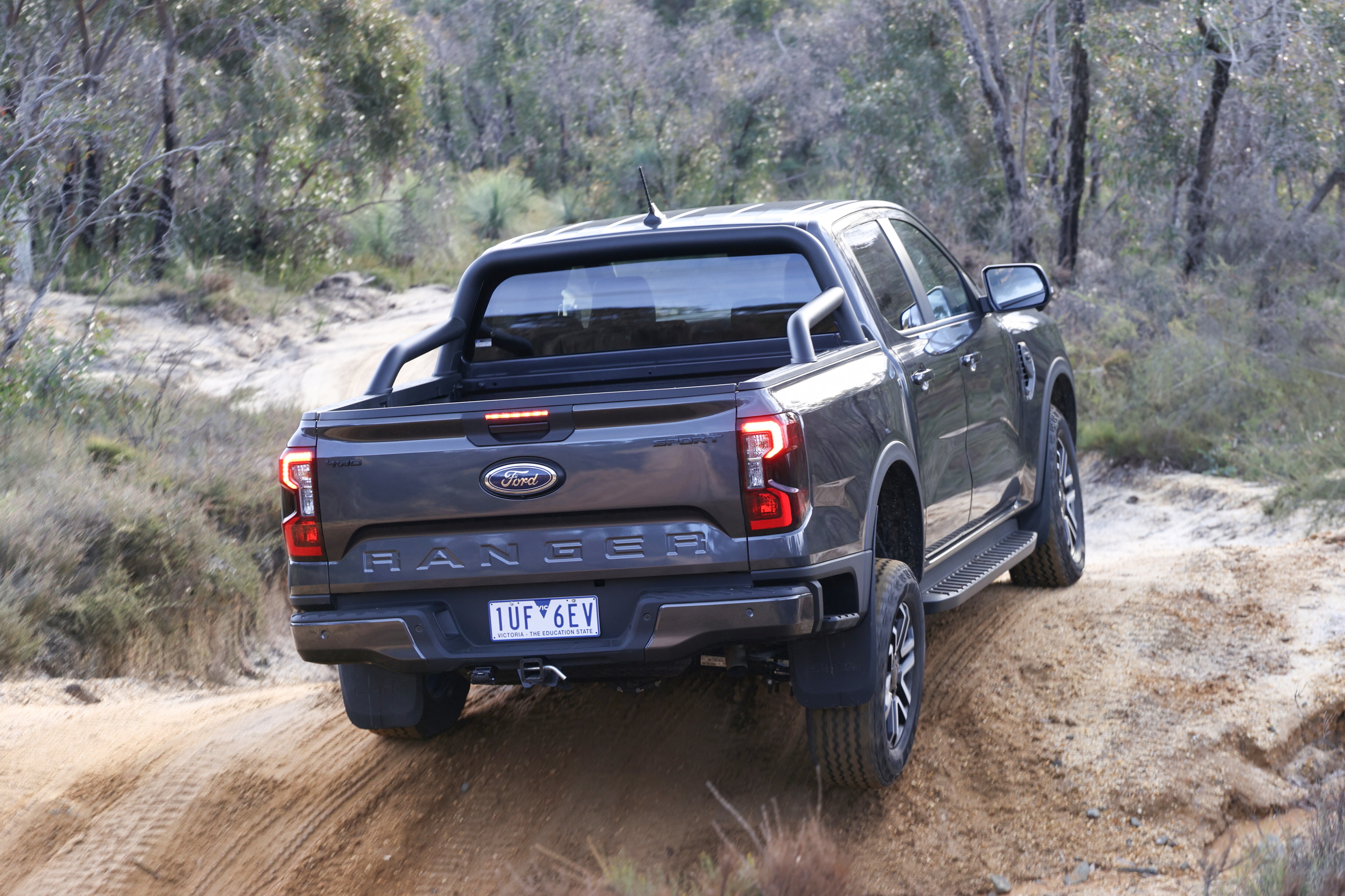
Towing
All new 4×4 Ford Rangers (except the Raptor) have a 3500kg towing rating when pulling a trailer with brakes.
The Gross Combined Mass (GCM) that is the maximum allowed weight of the Ranger, fuel, any cargo and accessories and the weight of the trailer behind the car, varies depending on model specification, but for the Ranger Sport V6 as tested here it is 6400kg and for the Ranger XLT I4 it is 6350kg.
These important figures are at or near the top of the mid-size ute category and are sure to entice buyers who want to haul a heavy boat, horse float, caravan or race car.
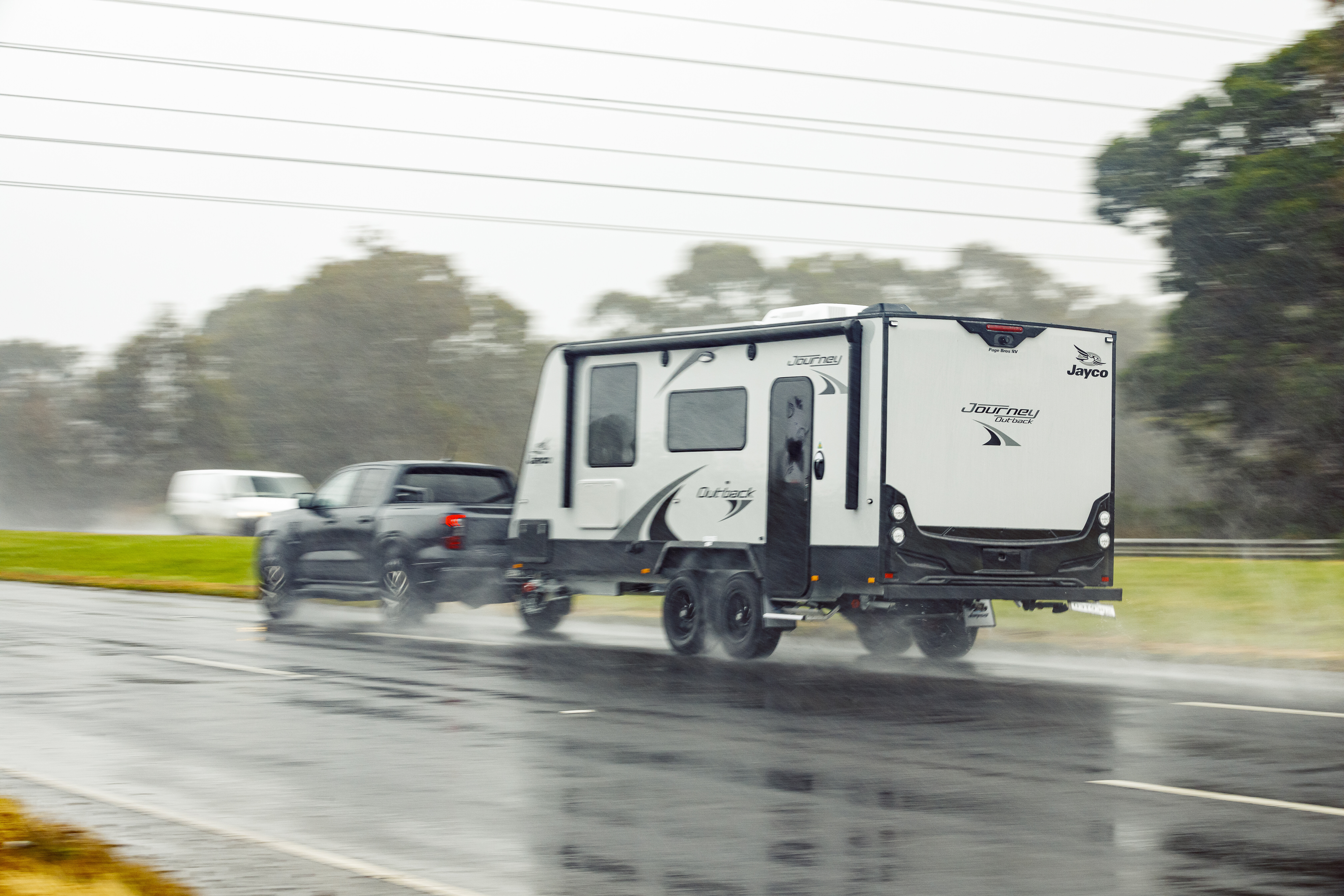
The Rangers also come with some amazing technology to make hooking up a trailer and towing easier and safer, especially for novices.
From the way the rear-view camera guides you back directly under the trailer hitch and the integrated trailer brake controller, to the on-screen towing checklist and ability to remotely check your trailers rear lights, the Ranger is equipped for hauling like no other ute.
We pulled a 2100kg caravan with the Ranger Sport and the V6 engine and 10-speed automatic transmission hauled it with ease. The ability to employ full-time 4×4 on wet roads was also a bonus to control wheel spin.
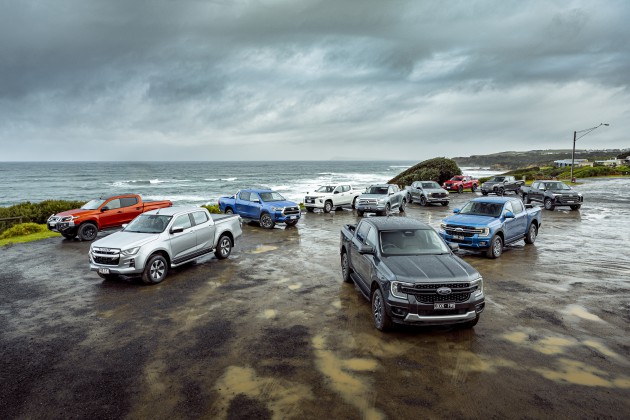
Dual-cab ute comparison 2022: The daily living test
Dual-cab utes have charged in as a firm favourite for family hauling and daily duties, well beyond the old mould of tradie tasks and off-road adventures. It’s time to see which are best suited to the role.
Cabin and accommodation
Stepping inside the new Ranger, passengers are greeted with an interior that raises the bar in the ute segment. It’s more modern looking and technically equipped than in the past, with a swag of features that will take some time to adapt to.
The Sport gets a huge 10-inch centre screen which not only has the usual sat-nav, audio controls, wireless Apple CarPlay and Android Auto, but also the HVAC controls and an off-road screen where you can control the off-road modes, diff lock and hill descent control.
Thankfully, Ford has included dials rather than buttons for the most used functions of audio volume and temperature controls as these are faster and easier to use than slow-responding buttons that can be difficult to locate quickly when your eyes are on the road.
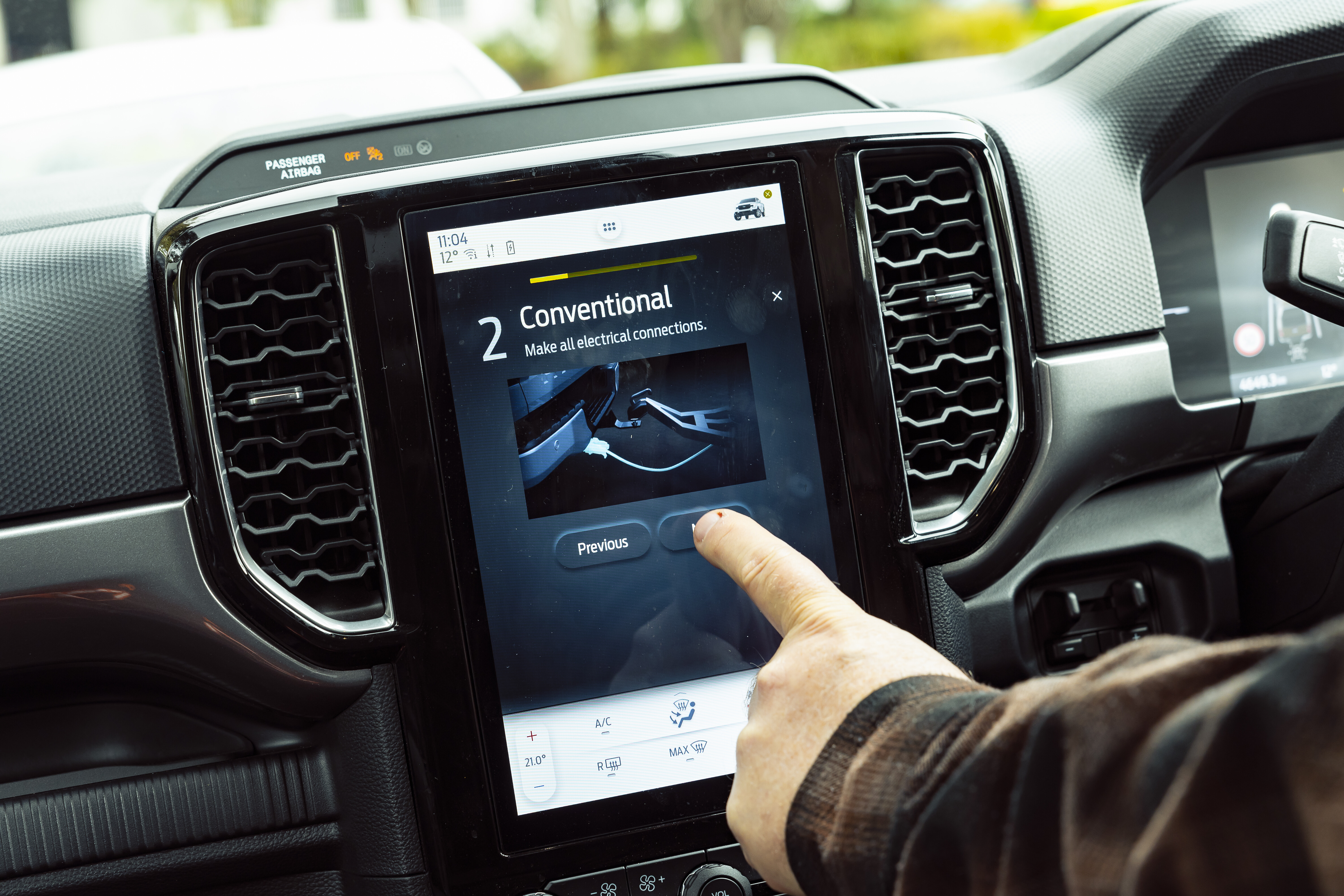
Beneath the screen is a wireless charging pad for your mobile phone from where it connects to Ford’s SYNC 4 system wirelessly for Apple CarPlay and Android Auto. A handy little shelf forward of the front-seat passenger and below the glove compartment for a convenient place to toss your phone, keys, wallet or whatever.
The driver sits behind a steering column that is now adjustable for both reach and height. Forward of the steering wheel is another large digital screen that is configurable to display the information you might want to see more often. You also get a full display of off-road settings up here when the off-road mode is selected.
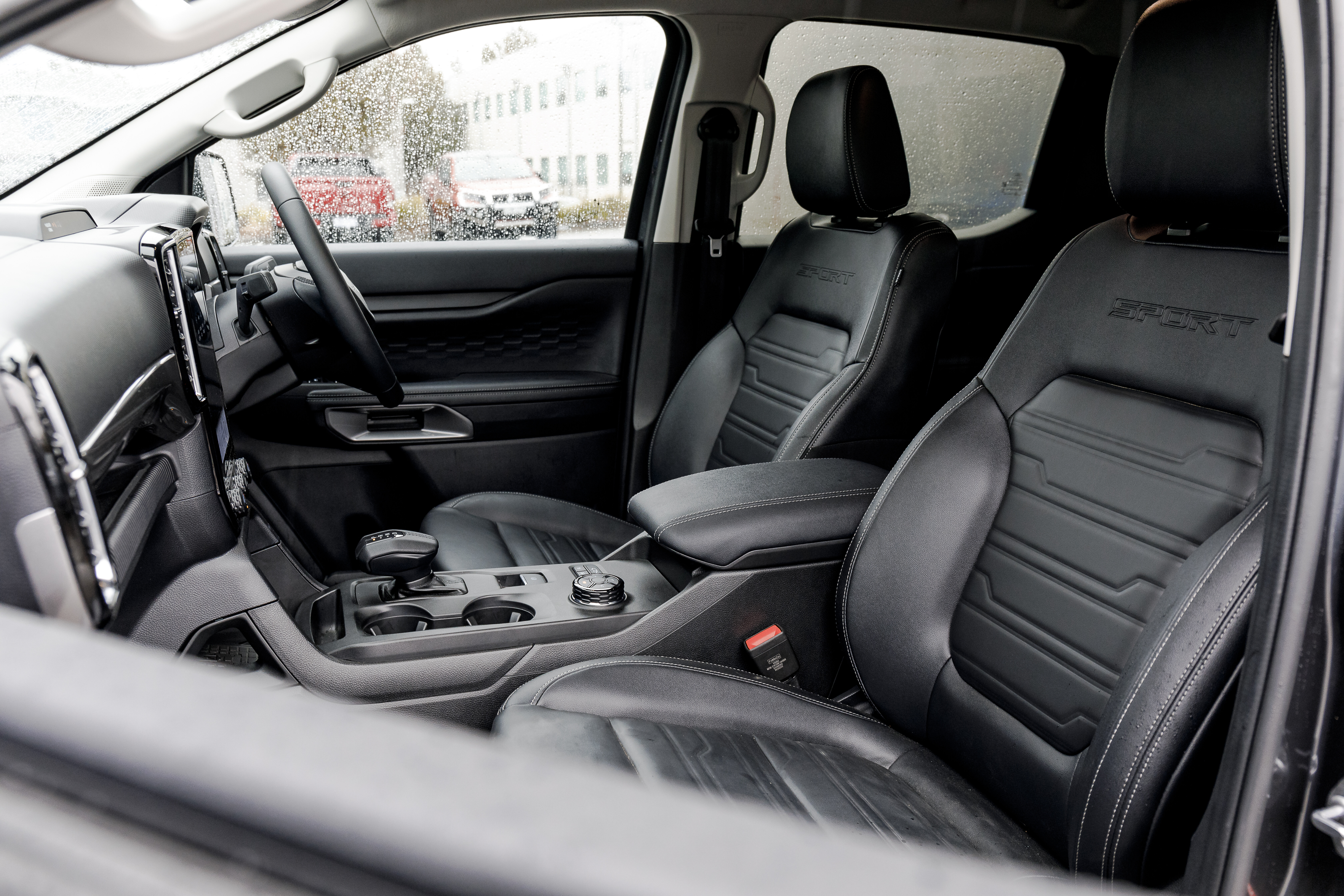
The Ranger has new seats across the model range and they have taller seat backs that better follow the shape of your spine for improved comfort and safety.
In the Ranger Sport they are leather covered and power adjustable in the front row, although you’ll need to step up to a Wildtrak if you want heated seats.
As the cabin is pretty much the same width as the outgoing model, the rear pew remains a tight squeeze for three adults across, but there’s plenty of headroom and adequate legroom. The new Ranger now has vents for the rear-seat passengers.
Speaking of the rear seats, some owners have complained that it can be difficult to fit child seats in the back, but it sounds like this is more related to the models of seats they are using and the length of the tether straps.
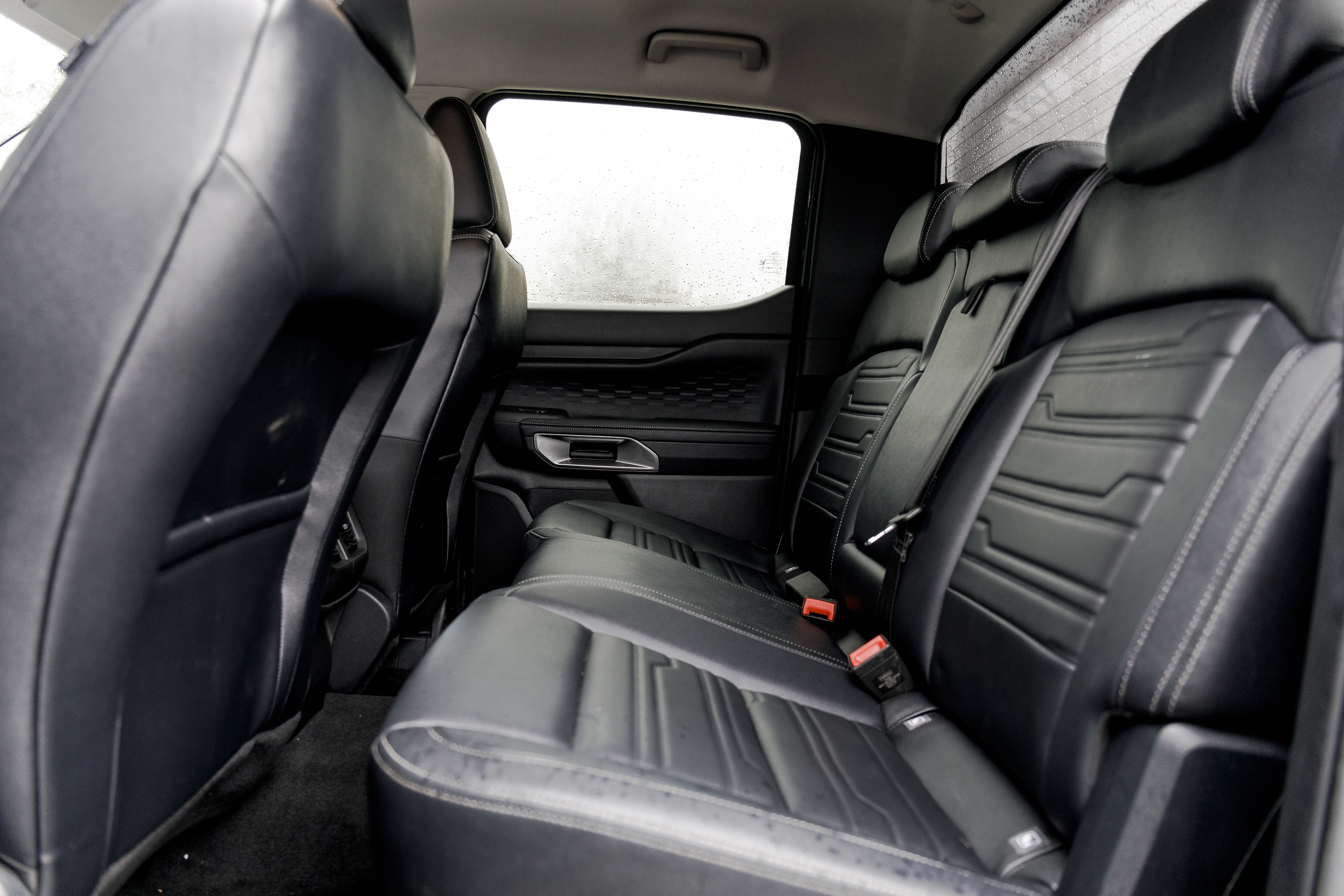
Safety
As the newest ute on the block you would expect the new Ranger to have the best safety features and it doesn’t disappoint here. The Ranger has a full 5-star ANCAP rating and was the highest scoring one-tonne ute to be tested by ANCAP to date.
Helping it to attain such a score are nine airbags, three-point lap/sash seatbelts all-round, childproof door locks, intelligent adaptive cruise control, blind-spot monitoring with cross-traffic alert and trailer coverage, speed-limit recognition, lane-keep assist with road-edge detection and driver alert.
It also has pre-collision assist with autonomous emergency braking (AEB), trailer sway control, front and rear parking sensors plus a rear-view camera.
A 360-degree camera is optional on the Sport and we found it handy on this test particularly when driving off road.
Disappointing is that only the Wildtrak Ranger model gets the important tyre-pressure monitoring system as standard equipment and the system is not offered as a factory accessory.
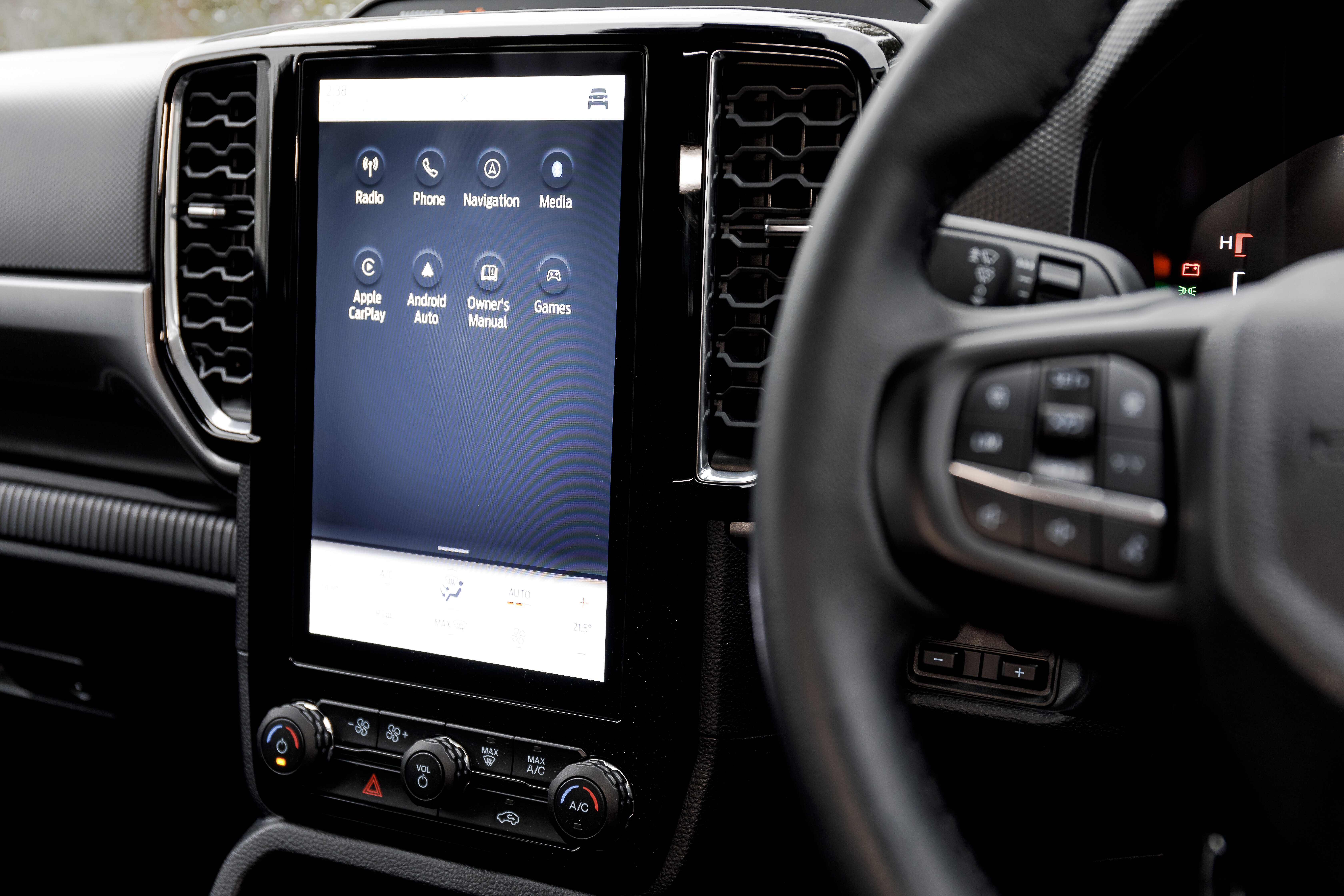
Practicalities
Ford clearly listened to feedback on how Ranger owners used their utes and how the company could improve the experience.
This led to things like the steps at the rear of the cargo tub sides to improve access to the back, exterior lighting changes, an integrated electronic brake controller for towing and a clever function that cycles through the lights so that you can check your trailer lamps.
On the Sport model as tested here, the integrated brake controller comes as part of a $900 optional ‘Touring Pack’ that also includes the 360° camera and four-zone exterior lighting. These features are standard on the Wildtrak.
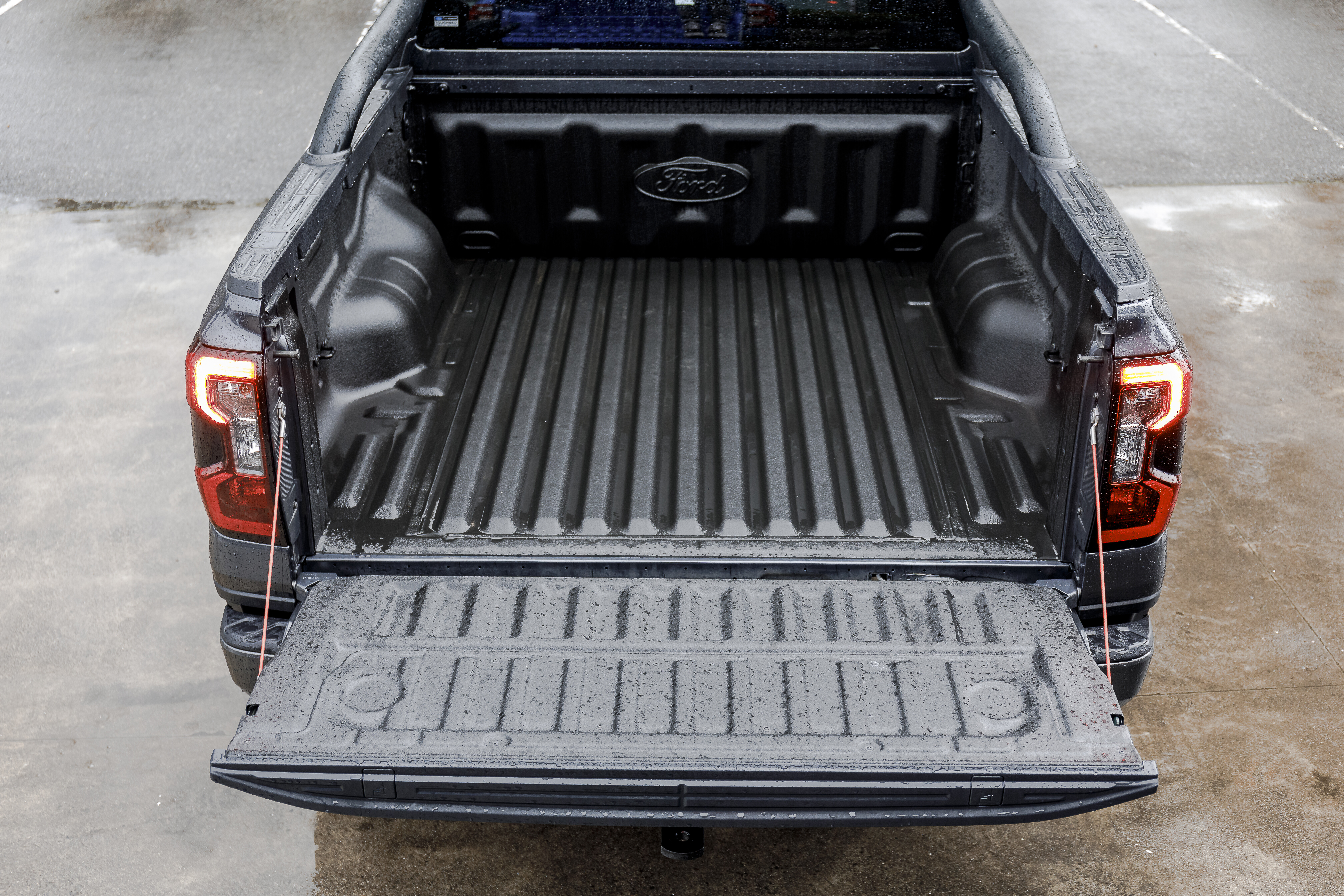
The company didn’t forget the essentials like maintaining a 3500kg towing capacity, 6400kg GCM, close to a tonne payload (934kg in the Sport V6), 800mm wading depth, and better than average overhangs and clearance.
That wading depth is class leading, but we still question the forward-facing air intake for the engine that all Rangers now have and would be looking for an intake snorkel if it were our car. Better news in the engine bay is the space for a second battery and the availability of a factory-backed accessories from ARB.
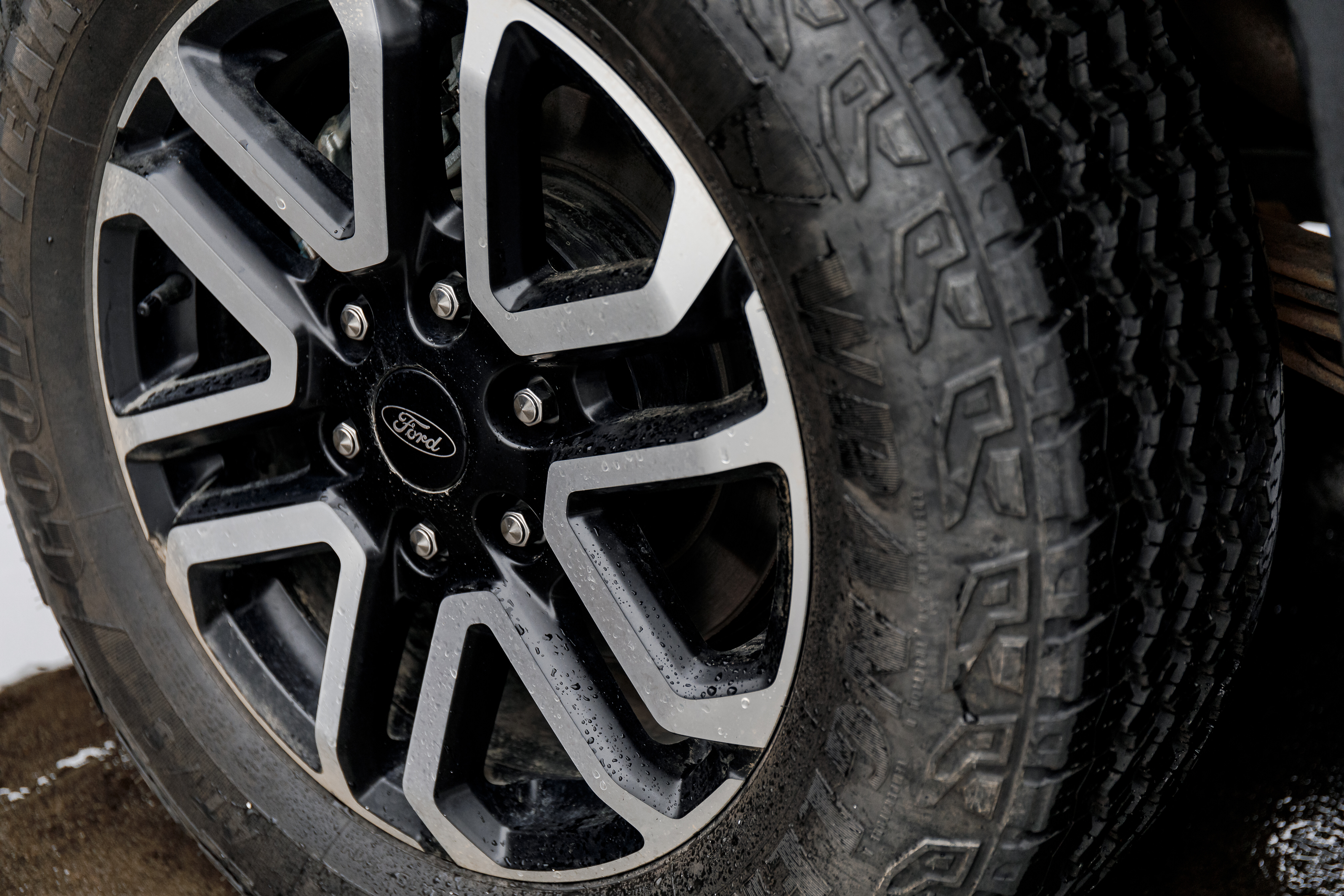
The wider wheel track allowed a wider cargo tub that now accommodates a Euro pallet in-between the wheel arches, and also features LED lighting, four tie-down points, a 12-volt power outlet and an easy-lift tailgate. Things like the clamping points and ruler on the tailgate seem a bit novel, but we’re sure someone out there will find a use for them.
Ranger Sport rides on 18-inch alloys wearing 255/65-section tyres so it shouldn’t be too hard to find tougher tyres for rough-road use, while there’s no reason you couldn’t fit the smaller diameter 17-inch wheels from the XLT or aftermarket, again better for off-road use.

VERDICT
The new Ford Ranger has certainly raised the bar in the mid-size ute segment and by introducing the Sport as a new model variant it has given buyers another reason to look at what’s behind the Blue Oval.
At around $70K drive away the Sport offers buyers a bit more luxury such as the leather seats and wireless phone charger over and above the XLT which has traditionally being the most popular model with recreational and family buyers.
At that price it’s more affordable than the top-of-the-range Wildtrak which adds features like heated seats, a powered roller shutter over the cargo tub and a style-feature sail plane that doesn’t really do anything.
No matter the model, or engine choice, the Next-Gen Ranger buyer will be getting the class-leader in terms of equipment, safety, towing and performance.
4X4 Australia's project builds
2023 Ford Ranger Sport V6 specs
| Price | $66,690 +ORC |
|---|---|
| Engine | V6 diesel |
| Capacity | 2993cc |
| Max Power | 184kW at 3250rpm |
| Max Torque | 600Nm from 1750 to 2250rpm |
| Transmission | 10-speed automatic |
| 4×4 System | Full-time 4×4 |
| Construction | 4-door ute on ladder chassis |
| Front Suspension | Independent via wishbones and coils |
| Rear Suspension | Live axle on leaf springs |
| Tyres | 255/65R18 on alloy wheels |
| Kerb Weight | 2264kg |
| GVM | 3280kg |
| Payload | 934kg |
| Towing Capacity | 3500kg |
| GCM | 6400kg |
| Seats | 5 |
| Fuel Tank | 80L |
| ADR Fuel Claim* | 8.4L/100km |
| On-Test Fuel Use | 11.4L/100km |
| Departure Angle | 25.6u00b0 |
| Approach Angle | 30u00b0 |
| Wading Depth | 800mm |
Things we like
- Performance and refinement of drivetrain
- Level of standard equipment
- Excellent off-road ability
Not so much
- No manual gearbox offered
- TPMS only standard on Wildtrak model
- Over complicated electronic features and functionality
We recommend
-
 Reviews
Reviews2023 Ford Ranger Raptor review
Faster, louder, better, more fun and more capable. Ford’s new ‘super truck’ trounces the original
-
 4x4 Comparisons
4x4 Comparisons2023 Ford Ranger vs Toyota HiLux comparison review: Off-road & on-road
Australia's favourite 4X4s go head-to-head
-
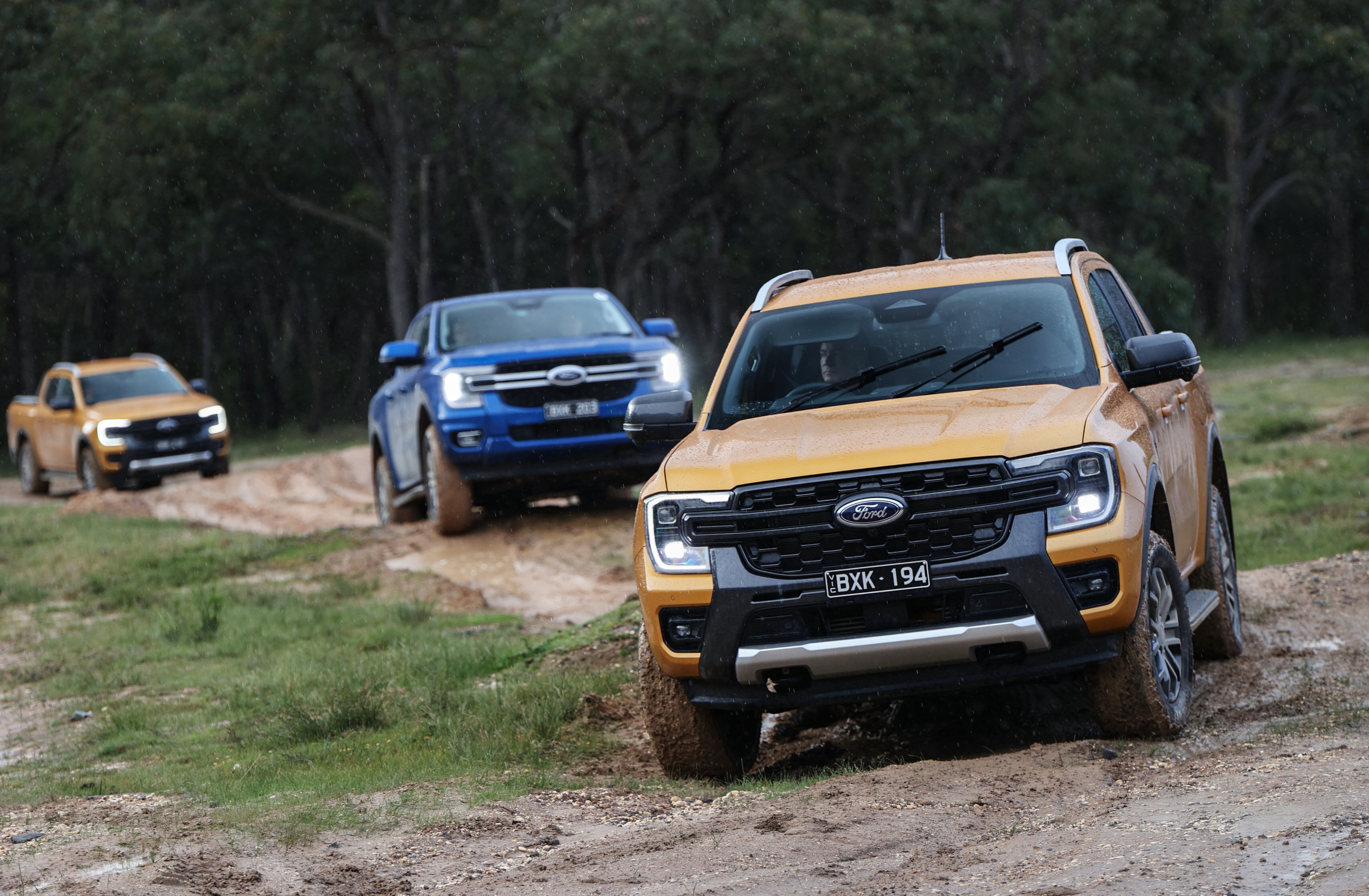 Reviews
Reviews2023 Ford Ranger 4X4 review – off-road and loaded up
Ford’s next-gen Ranger 4x4 ute is on sale now. We got behind the wheel at the vehicle's local launch


